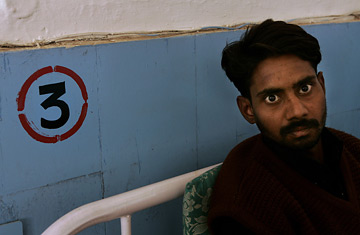
A man whose kidney was removed recovers at a city civil hospital in Gurgaon
Shocked but not surprised. That might be the best way to sum up India's reaction to the revelation this week that a black market organ transplant ring had been harvesting kidneys from poor Indian laborers, sometimes against their wishes, and using them in foreigners desperate for transplants. Police who busted the ring last week say doctors paid as little as $1000 for the kidneys and then sold them for as much as $37,500. The racket, based in Gurgaon, a business center close to the capital, New Delhi, drew victims from as many as eight Indian states and lasted for almost a decade. Police say the black market doctors may have illegally transplanted as many as 500 kidneys. The ring, according to the police, was run by two Indian brothers, neither of whom had any medical training but who oversaw the surgery. One of the brothers has been arrested in Mumbai, but the other, Amit Kumar, who police say was the racket's kingpin, is now the focus of an international manhunt and may have fled to Canada.
But while the details of this particular case are appalling, and the scam is the first — or at least first to be exposed — involving foreigners from as far away as the U.S. and U.K flying in for transplants, Indians are sadly all too familiar with organ rackets. In 2007, police in southern India uncovered an illegal kidney trade involving fishermen whose jobs had been destroyed by the Indian Ocean tsunami. A massive transplant ring in Punjab was also uncovered in 2003. Police there believe at least 30 of the donors, who as in this latest case were poor, illiterate workers promised riches for their organs and bused in to be operated on, died, despite promises that they would receive excellent post-operation medical care and that they had nothing to worry about.
India's illegal organ trade is driven in part by the incredible imbalance between supply and demand for legal organs. The Indian government banned the sale of kidneys for commercial gain in 1994; lawbreakers can be jailed for up to five years. But legal organ donations remain rare in India. The Multi Organ Harvesting Aid Network (MOHAN), a Chennai-based non-government group that promotes legal organ donation, puts donation rates in India at well under 1 per million, compared to rates of more than 20 per million in places such as Spain, the U.S. and France. The group's head Dr Sunil Shroff rejects the idea that Indian culture or religion is behind the low donation rates. "The reason is we haven't got our act together basically," he says. "The infrastructure is not there. The general perception is lacking."
The Indian government has encouraged more people to donate, and a few years ago began a campaign to increase the rate of cornea donations to try to fix the country's huge problems with blindness. But despite some success — the high-profile cricketer Anil Kumble and Bollywood actress Aishwarya Rai both promised to donate their eyes when they die — a 2003 study in the Indian Journal of Opthamology found that illiteracy and rural residence (read poverty) meant that only half of those persons interviewed "had knowledge of eye donation, 20% knew about corneal transplantation and only 4.34% of them knew when to donate their eyes."
Dodgy doctors exploit those same factors — illiteracy and poverty — to buy cheap organs on the black markets. There are millions of poor young men in India, desperate for a job and only too ready to travel to India's big cities at the promise of a quick buck. And even if they're not willing, they're still potential fodder. The Associated Press reported that while some donors sold their kidneys willingly, some were forcibly brought to clinics, held at gunpoint and then forced to undergo operations that they didn't want. "India is not such a literate population," says a spokeswoman from the National Human Rights Commission. "That's the main thing. There are a lot of people who are easy to take advantage of."
Shroff and his colleagues at MOHAN argue that if India can push its legal donation rates up "then we can take care of the shortage and stop these kind of horror stories." But encouraging families to donate the organs of their recently deceased after this week's terrible revelations is no easy task. "For the next month or two it's going to be extremely hard to get a family to donate because they think it's some big scam," says Shroff. "That's the wider damage this type of story does."
